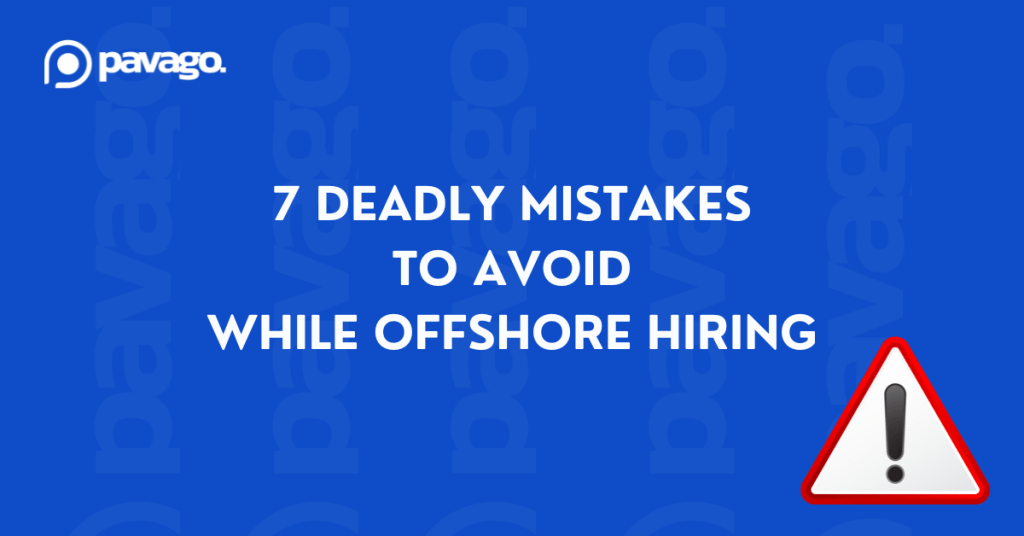When we discuss hiring remote employees, especially from other countries, opinions tend to be pretty divided. On one side, you’ve got people singing their praises—“They’re incredible, my business is scaling like crazy!” And on the other, you hear the naysayers—“Total waste of time and money.” So, what’s the real deal?
The truth lies somewhere in between, but the good news is that you don’t have to figure it out the hard way. We’ve pulled together the 7 deadly mistakes businesses make when hiring offshore talent. By learning from others’ slip-ups, you can sidestep the pitfalls and identify the real potential of remote staffing.
✌️ Looking to hire the best offshore talent?
Pavago helps US SMBs hire the top 1% of remote talent from Pakistan and Latin America. From finding potential candidates to onboarding, we hire offshore talent in just 3 weeks or less.
1. Not Having an Offshore Recruitment Strategy
You wouldn’t build a house without a blueprint, right? The same goes for hiring offshore employees. Without a strategic approach to recruitment, you’re setting yourself up for a series of avoidable headaches.
A well-thought-out recruitment strategy means identifying which roles are best suited for offshore talent and then tailoring your recruitment efforts accordingly. Not every role can be offshored or outsourced.
Job roles that are process-driven, require specialized skills, or involve repetitive tasks are often prime candidates for offshore outsourcing. For example, admin tasks, sales, customer support, software development, and digital marketing.
2. Focusing Solely on Cost Savings
While cost savings is one of the primary reasons businesses hire offshore talent, it should not be the only factor in your decision-making process.
Focusing too much on saving money can lead to poor hiring decisions and ultimately, a decrease in the quality of work.
It’s not easy to find and hire the best offshore marketing specialists. And going for the cheapest option might seem like a quick win—but it doesn’t deliver the results you want.
In fact, it can turn out to be the priciest mistake. Why? Because when the quality isn’t there, you’ll end up searching for somebody else. And starting over is a headache that drains your time, energy, and focus.
💡 Pro tip: Focus on finding top-quality talent, not just the cheapest option. Not sure how? At Pavago, we specialize in recruiting highly skilled offshore professionals who deliver results. Our rigorous 5 step hiring process ensures you get the best talent tailored to your specific needs, without compromising on quality.
3. Failing to Define Clear Expectations and Communication Channels
Clear communication is the backbone of any successful project. But when you’re working with an offshore team, it becomes even more critical.
Imagine starting a project with your offshore team without clearly outlining who’s responsible for what, how often updates should be shared, or which tools should be used for communication.
It’s like driving without a GPS—you might eventually reach your destination, but not without a few wrong turns, delays, and headaches along the way.
💡 Pro tip: Set up detailed project guidelines. Define roles and responsibilities, establish regular check-ins, and choose communication tools like Slack, Gmail, Zoom, and Trello
4. Underestimating Time Zone Differences
One of the sneakiest mistakes businesses make when hiring offshore talent is underestimating the challenges posed by time zone differences.
You might think, “What’s a few hours’ difference?” But when your team is spread across multiple continents, those few hours can quickly add up to missed deadlines, delayed responses, and a whole lot of frustration.
For example, your offshore team is just starting their day while your local team is wrapping up. Urgent issues pile up, but no one’s around to handle them until the next day. By then, the problem has snowballed.
💡 So, how do you tackle the time zone difference? Plan ahead. Identify overlapping work hours, set expectations for response times. Its best to hire people who can work in EST time zone. Offshore candidates from Pakistan and Latin America are well known to work in US time zone.
With a little planning, you can turn time zone challenges into a round-the-clock productivity advantage.
5. Neglecting to Vet Talent Thoroughly
Employees are the most important asset of a company, but only if you’ve got the right people on board. One of the deadliest mistakes you can make is rushing through the vetting process—or worse, skipping it altogether. It happens most of the times when you hire freelancers and part-time job seekers from platforms like Fiver and Upwork.
Sure, the candidate has a promising resume and seems like a perfect fit, but have you really dug deep? Have you checked their references, tested their skills, or conducted a trial project? If not, your business operations are at risk.
To avoid this mistake, take your time during the hiring process. Conduct multiple rounds of interviews, ask for work samples or portfolios, and don’t hesitate to run a trial period.
You want to be confident that your offshore team members not only have the skills but also align with your company’s values and work culture.
✌️ Don't have time to vet talent? No worries! reach out to Pavago - A Global Recruitment Agency in the US. Our aim is to help you hire the best remote talent across the globe. You can hire:
> Virtual Assistants
> SDRs
> Cold Callers
> Marketing professionals and many more.
6. Not Integrating Your Offshore Employees with Onshore Teams
The classic “us versus them” scenario – one of the most common yet overlooked mistakes is not knowing how to onboard remote employees after hiring offshore talent.
Your offshore employees shouldn’t just be an “add-on” to your existing team; they should be an integral part of your overall strategy. It fosters a sense of unity and ensures that everyone is on the same page, no matter where they’re located.
💡 So how do you do it? Start by promoting regular communication and collaboration between your onshore and offshore teams. Use tools like Zoom for calls, Slack for team chats, and Asana for task management. So that you’ll be able to create a virtual office environment where everyone can contribute and stay connected.
When your teams work together like a well-oiled machine, everyone wins!
7. Not Knowing How to Manage Offshore Teams

Working with offshore teams requires a different set of skills—ones that, if you’re not prepared for, can lead to some serious problems.
You might send an email or drop a message in Slack, but if you don’t know how to manage effectively in a remote setting, things can quickly go off the rails.
Deadlines get missed, quality takes a nosedive, and before you know it, your project is spiraling out of control.
So, what’s the secret sauce for managing remote employees? First of all, be clear and precise with your expectations. Ambiguity is your enemy here. Spell out exactly what you need, when you need it, and how you want it done.
Establishing systems when hiring offshore essentially comes down to:
- Clearly communicate workflows and expectations from the start.
- Use tech stack for effective communication.
- Set up regular reporting to monitor progress.
- Manage projects with tools like Trello or Asana.
- Conduct frequent check-ins to maintain momentum.
- Gather and apply feedback from your remote team.
Key Takeaways
When you think about hiring offshore talent, you might picture handing off tasks and wiping your hands clean. But it’s not about offloading responsibilities—it’s about strategic enhancement. You need to thoroughly assess the benefits and drawbacks, nail down a solid strategy, choose the best candidate, and find a reliable recruitment partner that aligns with your vision.
You’ll see how effortlessly your firm can grow by fine-tuning the 7 strategies we’ve discussed. Put these tips into action, leverage the skills of high-caliber international offshore employees, and watch as remarkable results unfold.
Hire Top 1% Offshore Talent with Pavago
Business owners are very busy, but that’s no excuse to skimp on hiring offshore talent. There are specialized offshore recruitment agencies like and our core business is to help SMBs hire the best remote professionals.
Hiring through Pavago means more than just getting top talent. You’ll benefit from our full range of support services to ensure your new hires succeed and integrate seamlessly into your business.

















